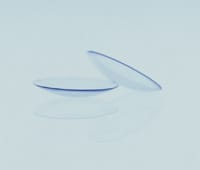contact
lens business
Cosmetic Lenses and Teens
Plenty of outlets still sell these lenses "No prescription needed!" Here's what you can do about it.
By Christopher Kent, Senior Associate Editor
PHOTOGRAPHER: STEVE SMITH

Last fall, before the FDA began making a fuss about cosmetic lenses, a contact lens specialist we know happened into a store that specialized in selling accessories such as hair clips and jewelry. To her surprise, she noticed sample boxes of contact lens solutions by the cash register.
When she asked if someone working at the store fit contacts, the sales clerk said no; they just sold cosmetic lenses. "Anyone can wear them," he said. "They only change your eye color. One size fits all." She asked whether they taught people to put them in. No. Did they check fit with a slit lamp? No. Did they explain how long it's safe to wear them? She found his answer a little frightening: "Until they bother you."
Soon after that the FDA announced it was taking steps to prevent the sale of these lenses outside of a doctor's office. Unfor-tunately, the belief that these lenses don't require fitting or special care, and that it's safe to share them with friends, is still rampant. And there's no shortage of outlets willing to make money by taking advantage of this belief.
Naturally, teenagers are a prime target; they usually like the idea of changing their appearance, and they're less likely to be aware of the potential dangers.

The FDA's crackdown may be having an effect in terms of storefront sales, but anyone can still purchase these lenses without a prescription on the Web. Some of the sites that are most blatant in terms of encouraging purchasers to bypass a doctor are based in other countries such as the United Kingdom. Sites such as v www.bigbrowneyes.co.uk and PhunkyEyes.com offer catalogs of contact lenses with the banner "No prescription needed!"
In many cases the item descriptions do advise you not to wear them overnight, and you can visit a separate page on the site that talks about lens care. But nothing suggests that the lenses should be fitted or monitored by an eyecare professional. (And nothing on the catalog page suggests that you need to read the lens care section!)
And what does the "lens care" section at the site recommend? At www.bigbrowneyes.co.uk, suggestions include consulting a contact lens practitioner in two circumstances: before wearing contact lenses if you're "suffering from any eye problems," and if you experience "pain, redness, burning sensation, excessive watering, increasingly blurred vision . . ." (etc.) while wearing the lenses.
Most American-based Web sites are a little more straightforward about mentioning professional supervision, but the possibility of abuse is just as great.

Since buyer ignorance is the heart of the problem, spreading the word that contact lenses are not just "fashion accessories" is probably the most helpful thing any eyecare professional can do.
At the same time, if you think that cosmetic lenses are being sold without a prescription in your area, have someone in your office check it out. Once you're sure, call the sales rep for the companies whose brands are being sold; in most cases, they'll put a quick stop to it. You can also report illegal sales to the FDA.
It's especially important to report medical problems that have resulted from casual, non-prescription wear to the FDA; without statistics it's difficult to justify legal intervention. To do so, the FDA requests that you contact MedWatch, its voluntary reporting program. You can get information to MedWatch online at http://www.accessdata.fda.gov/scripts/medwatch/, by telephone at 1-800-FDA-1088, or by fax at 1-800-FDA-0178.








